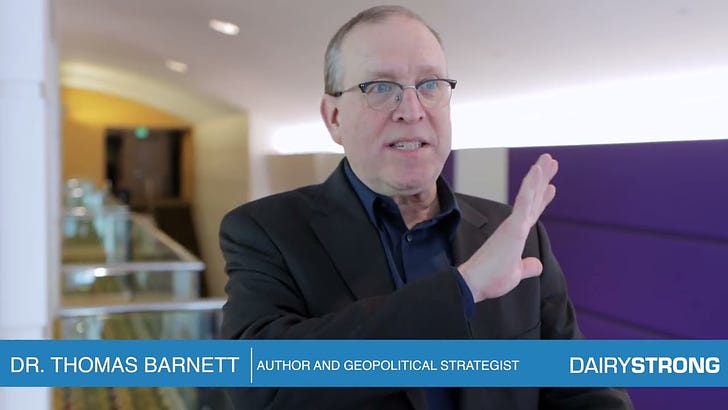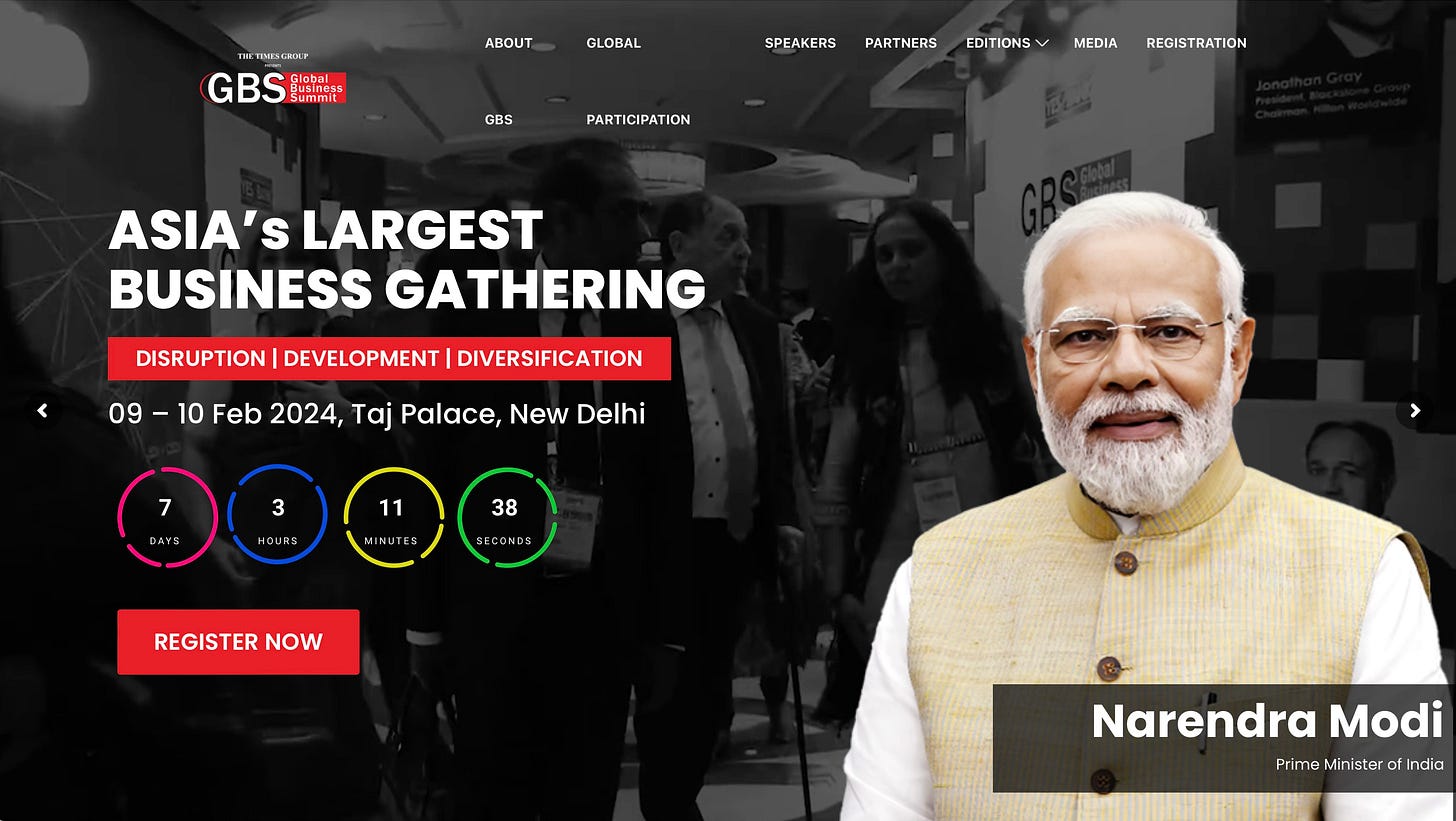Remember when I said my dog ate my new passport? Well, I wasn’t kidding, and it stressed me out completely.
Why?
Next Wednesday my spouse and I are flying to India for me to speak at the Times of India’s Global Business Summit on the 10th.
No worries, I am pre-loading a week’s worth of Substack posts to maintain my daily output. I also got a new passport on an emergency-need basis in Chicago, coming back from my recent Green Bay Wisconsin gig (Dairy Board Association above).
Here’s how the Times describes it:
The Times Group Global Business Summit 2024 - Business Titans and Visionaries to discuss Disruption, Development, and Diversification
02 Feb, 2024.
NEW DELHI, Feb. 2, 2024 /PRNewswire/ -- India Inc. has marked its calendar for the 8th Edition of The Times Group Global Business Summit, an esteemed gathering recognized as one of the largest of its kind in Asia. Set against the backdrop of Taj Palace in New Delhi, India, this influential summit will take place on the 9th and 10th February 2024.
Distinguished global leaders, representing diverse fields, will converge to deliberate on contemporary issues and shape the trajectory for the future. This year's summit promises an engaging discourse, bringing together government officials, public figures, corporate executives, business titans, academicians, and technocrats from around the globe. Together, they will explore the intricacies of the global landscape, forecast its future course, and collaboratively devise pragmatic solutions.
Leading the charge will be Prime Minister Narendra Modi, alongside esteemed global business leaders such as Raymond T. Dalio Founder, CIO Mentor and Member of the Bridgewater Board, Bridgewater Associates LP; Bill Winters, Group CEO, Standard Chartered; Jenny Johnson, President and Chief Executive Officer, Franklin Templeton; Ravi Kumar S, Chief Executive Officer, Cognizant; Michael Spence, Nobel Prize in Economics, 2001 and Professor and Dean Emeritus Stanford University; Jeff Maggioncalda, Chief Executive Officer, Coursera, David Hanson, Chief Executive Officer & Founder; Co-Founder, Hanson Robotics; SingularityNET among other notable figures. The overarching theme of the summit is "Disruption, Development, and Diversification," where these influential leaders will converge to address pressing global issues.
Highlighted topics on the agenda include:- Raymond T. Dalio Founder, CIO Mentor and Member of the Bridgewater Board, Bridgewater Associates LP: Principles for Dealing with the Changing World Order
- Bill Winters, Group CEO, Standard Chartered, Jenny Johnson, President and Chief Executive Officer, Franklin Templeton, Ravi Kumar S, Chief Executive Officer, Cognizant: Navigating Fissures, Faultlines, and the Future – In Pursuit of Equilibrium
- Michael Spence, Nobel Prize in Economics, 2001 and Professor and Dean Emeritus Stanford University: Navigating AI Revolution: People and Machines as Collaborators and not Competitors
- Jeff Maggioncalda, Chief Executive Officer, Coursera: Upskilling, Reskilling and Learning for the Future
- David Hanson, Chief Executive Officer & Founder; Co-Founder, Hanson Robotics; SingularityNET: Navigating AI Revolution: People and Machines as Collaborators and not Competitors
Talking about the summit, Ravi Kumar S, CEO, Cognizant said, "The transformative power of generative AI has the potential to greatly expand our knowledge, skills, and productivity. Generative AI is the most powerful tool we have to solve the biggest problems of our time. At Cognizant, we believe that generative AI—used responsibly and ethically, as a partner to people—will create opportunity for human beings to do what they do uniquely well: apply their judgment and reason, find new problems to solve, make sense of complex situations, and lead others to get extraordinary things done."
Spiros Margaris, Venture Capitalist, Margaris Ventures added "I am excited to participate in Global Business Summit (GBS) to hear new visionary ideas and the latest global growth strategies. In my address, I will share my VC perspective on the global trends in Artificial Intelligence and Fintech."
Lord Gerry Grimstone, Chairman, Gemcorp Capital Management & former U.K. Minister for Investment said "Global investors see India as a powerhouse of enterprise and entrepreneurialism but often need help to understand and unlock the myriad of opportunities. The Global Business Summit provides the golden key by bringing together both thought leaders and decision-makers. Foreign investment is the vital ingredient that India needs to deliver its lofty economic ambitions."
About The Times Group Global Business Summit
The Times Group Global Business Summit stands as a distinguished platform that has hosted an illustrious array of personalities, both from India and around the world. This distinguished list includes luminaries such as Prime Minister Narendra Modi, the visionary Bill Gates from Microsoft, Brian Chesky of Airbnb, Arianna Huffington from Huffington Post Media Group, Dara Khosrowshahi, the leader of Uber, Reed Hastings representing Netflix, the innovative Steve Wozniakfrom Apple, renowned venture capitalist Guy Kawasaki, Anshula Kant from the World Bank Group, Gautam Adani of Adani Group, Sunil Bharti Mittal from Bharti Enterprises, the iconic actor Shah Rukh Khan, and the esteemed Economist and Nobel Laureate Paul Krugman, among other influential figures. This summit continues to be a nexus of unparalleled insights and global perspectives, bringing together the brightest minds to shape the future of business and innovation.
I’ve been honored with a plenary talk. It will be blistering at 15 mins. I have a 60-click brief (15 seconds per) ready to roll.
Here’s how they’re pitching me personally on X:
Toward that end, here is a slide I am toying with adding:
It’s not done and you’re looking at it fully loaded (it is animated for less clutter and sequencing).
The basic idea, which I have been toying with and which I broach in the book, is: We look at grand strategy as very big-piece-oriented: control the enviro, control the nations, control the people.
But, with the digitalization of globalization, I think the opportunity exists to turn that logic on its head and go completely subnational (subatomic in the metaphor of getting inside a person’s head and “cracking” their identity). By getting inside their datasphere, one gains access to all (held identities, relations with others, consumption of goods-services-content), allowing you, upon capture of that big data and manipulation with AI (extremely good and cheap predictions) to meet that individual’s needs to the point of deep conditioning within your preferred ideological worldview.
My point with the company logos: we have all these players pushing this sort of Orwellian manipulation and capture now. They’re just only so organized and coordinated — in the free West. But, in my mind, those coordination and state control mechanisms are coming. I also interpret China’s efforts on making itself network-centric across 5G and the Internet of Things as revealing their ambitions for the AI of Things down the road.
All of this represents my attempt (rough draft, mind you) to articulate an inverted grand strategy, one that isn’t big-piece, big-force focused but one that gets inside the head of the targeted population — a very bottom-up capture.
Here’s how I argue it in my book, using the handy projection of the metaverse as a downstream example:
Here we must account for the onrush of the metaverse: an evolving iteration of today’s internet that will be home to all manner of virtual worlds within which users can interact with computer-generated environments and other users. To the extent the real world increasingly disappoints younger generations—particularly in diminishing their sense of national pride and citizenship—we should expect these digital natives to seek something better (community, belonging, identity, etc.) in the metaverse—to include the forging of new forms of political allegiance.
This is already happening all around us. A key example is foreign governments cyber-meddling in America’s elections, which are becoming a superpower battleground unto themselves. Vladimir Putin has succeeded in capturing, by virtual means, the hearts and minds of a significant portion of America’s Republican Party base—a stunning achievement demonstrating the power of this dynamic. Then there are extremist groups that recruit new mem- bers through internet chat rooms and propagandistic YouTube videos. QAnon, for example, is but the latest in a long line of apocalyptic American cults prep- ping adherents for an End Times–like spasm of “righteous” violence.
Per the old Leninist term, the internet presents an endless supply of “useful idiots” eagerly awaiting activation. Seemingly overnight, citizens can be swayed to switch political and even national allegiances—bodies cyber-snatched by unseen, un-present forces. It is a national security nightmare: Who can be trusted when allegiances are so easily converted within that nebulous realm?
Our quintet of superpowers, along with a host of lesser great powers, invest vast sums of money and brainpower to address this challenge, to include fire- walling national networks. But the numbers of individuals escaping from closed to open networks will only expand, as will determined efforts by governments to poach allegiants from opposing networks. Cybersecurity experts emphasize the threats posed to hard infrastructure (e.g., shutting down a nation’s electrical grid), when—in truth—those posed to our human infrastructure (i.e., social cohesion) are far greater.
Recall that kinetic warfare has migrated from the system level, down past the nation-state level, and into the subnational level, meaning the fight now unfolds overwhelmingly among individuals. The same is happening in cyber- space, where individual hearts and minds are being won or poisoned in num- bers sufficient to trigger regime change dynamics in any political system—to include America’s own experience with the January 6th Insurrection.
That terrifying realization motivates a lot of policy dialogues today in Washington—at least on one side of the political aisle. It triggers Beijing’s intense focus on cyber-pacification of its citizenry—and of ours, too, if we are not vigilant. It also fuels China’s ambition to rule 5G networks around the world, giving them a direct line into individuals’ daily lives and thoughts.
You can see what I was reaching for in the book. The slide above is an attempt to visually project that ideological battlespace, as it were.
I am very interested in any feedback anyone can offer.
Anyway, I am psyched to go to India. Cashed out a biz-class ticket to get two economies so my spouse could tag along (since the Times is footing the travel bill) — a trick I learned long ago at these events and a great way to not stress your marriage by disappearing overseas.
I haven’t been in India since 2001 (Mumbai, for the 50th anniversary of the founding of the Indian Navy). It should be an enlightened experience, as we plan on staying behind a bit after the conference (our nickel) to do some sightseeing.








Will be recorded. I think livestreamed too. Will seek to relay that, but likely just on GBS site.
Feedback best through substack chat channel.
Very interesting... I am curious, what is your preferred feedback channel, lest I drop an essay in your comment section? hah!